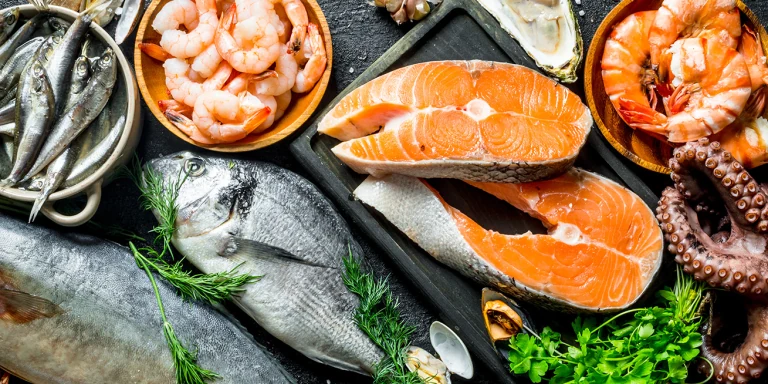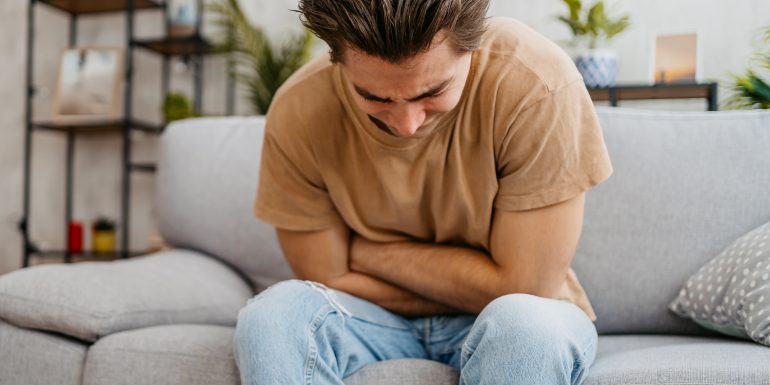
Food poisoning: the symptoms, progression and treatment
What can you do if you have food poisoning? How long does food poisoning last, and what can you eat if you have food poisoning? You’ll also find out when you should seek out a doctor.
What is food poisoning?
You can get food poisoning, for example, if you eat food that’s contaminated with bacteria and the toxins they have already produced. Other triggers are fungi and plant toxins. You absorb these toxins directly through your food.
In the case of a foodborne infection, however, the bacteria enter your body in what you eat. Only there do they start to multiply and produce toxins, triggering the infection. The symptoms of foodborne infections and food poisoning are similar for the most part.
The symptoms food poisoning
The first signs of food poisoning are almost always the same:
- Stomach ache: Stomach pains are a common symptom in cases of food poisoning. They can also lead to stomach cramps.
- Nausea: Food poisoning usually causes nausea, and often vomiting as well.
- Diarrhoea: Diarrhoea is a typical symptom of food poisoning.
- Flatulence: Food poisoning often causes bloating, flatulence and loud abdominal noises.
- Dehydration: Diarrhoea often leads to dehydration. Sufferers may then experience confusion and cardiovascular complaints.
- Skin reactions: Food poisoning can also produce skin reactions including conjunctivitis, a burning sensation in your mouth, general reddening and hives.
In severe cases, shortness of breath, heart palpitations, low blood pressure and poor circulation may develop, although this is rare. Seek medical assistance immediately if you notice any of these symptoms.
Other symptoms may develop depending on what caused the foodborne infection or food poisoning:
- Headaches: Food poisoning will give you a headache if it is caused by campylobacter, listeria or yersinia bacteria.
- Fever: Food poisoning caused by salmonella will often be accompanied by a fever.
- Limb pain: If food poisoning causes pain in your limbs or muscles then listeria is often the culprit.
- Dizziness: Food poisoning can sometimes be associated with dizziness. In this case, fungi are often the cause.
- Shivering: Food poisoning is occasionally accompanied by shivering. The possible causes in this case are salmonella, yersinia or fungi.
It’s worth noting that food poisoning rarely occurs without diarrhoea. Cases of food poisoning that do not involve vomiting and nausea are also not typical.
It is not easy to tell from the symptoms whether you have gastroenteritis or food poisoning. You should focus on the timing instead. Make a note of what you’ve eaten recently. Do the symptoms appear after you eat something in particular? Have other people eaten the same thing, and are they also showing the typical symptoms? This would suggest food poisoning. Your doctor will be able to give you a clear diagnosis of whether you have food poisoning or gastroenteritis. He or she may arrange a stool test if necessary. The presence of potential pathogens will then be verified in a laboratory.
Food poisoning: how does it progress?
How long does food poisoning take to develop? Depending on the pathogen causing the food poisoning, the incubation time can range from a few minutes to hours or even days.
Most cases of food poisoning are mild. Although mild food poisoning does produce the typical symptoms, they die down of their own accord after a few days. Mild food poisoning doesn’t usually involve complaints such as fever or blood in your stools. There are also more severe forms of food poisoning with different durations.
How long does food poisoning last?
The duration and progression of food poisoning depend on a number of different factors. The sufferer’s general health and the causes of the food poisoning, for example, are decisive factors in this respect.
Women’s immune systems are weakened when they’re pregnant. This means that their bodies are less able to fend off toxins or infections. Cases of food poisoning and foodborne infections are more severe as a result. This poses risks both to the expectant mother and to her unborn child, such as the risk of premature birth.
Is food poisoning contagious?
Food poisoning is never contagious. This is not the case for foodborne infections, however, as sufferers may still be able to pass the bacteria on to others for several weeks.
Food poisoning: when should you seek out a doctor?
You should see a doctor if you think you might have a foodborne infection or food poisoning and the symptoms persist for three days. The same applies if the symptoms are severe. You may even need to spend some time in hospital. You should consult a medical professional immediately if your child exhibits the typical symptoms. You should also see a doctor right away if you are elderly or immunocompromised. This will help you avert a severe case of the disease in good time.
Food poisoning: food as a risk factor
There are various different foods that pose a risk of food poisoning or a foodborne infection. These include:
- Meat, such as chicken, beef, pork etc.
- Raw milk and raw milk products
- Raw eggs, including in raw cake mixture
- Packaged salad
- Homemade pickled vegetables
- Spoilt fungi
- Soft cheese
- Unclean drinking water
What is fish poisoning?
Fish, muscles and other types of seafood are also potential sources of food poisoning, which in this case is referred to as “fish poisoning”. The following foods can lead to this kind of poisoning:
- Incorrectly stored/refrigerated fish
- Smoked fish
- Tinned fish, such as tins of tuna or sardines that have been kept unsealed in the fridge
- Raw fish, for example in sushi
- Tropical fish (such as grouper or barracuda)
Food poisoning: how can you prevent it?
There are a number of steps you can take to reduce your risk of food poisoning. Keep these points in mind:
- Wash your hands, cooking utensils and work surfaces regularly when working in the kitchen.
- Heat your food properly. Cook meat at a temperature of at least 70°C, for example.
- Keep food adequately refrigerated, particularly in the warmer months.
- Always use a separate chopping board for raw meat or fish, and keep it away from other foods.
- Wash raw fruits and vegetables thoroughly before eating them.
- Avoid storing food unsealed in the fridge.
The risk of food poisoning is particularly high when you’re on holiday on account of the different food hygiene rules that apply in different countries. Your rule should be “fry it, boil it, peel it or forget it”. You should also never eat street food, and exercise caution when eating from cold buffets or egg-based meals. Always opt for freshly prepared food if you can.
What remedies are there for food poisoning?
The best response to food poisoning depends on what your specific complaints are. Sometimes all you have to do is take things easy and drink plenty of water. If you experience stronger symptoms such as severe diarrhoea, you should drink an electrolyte solution, which you can get from a pharmacy. A homemade sugar-salt solution will also help if you have food poisoning. This household remedy is easy to make: Boil 1 litre of water. Add 5 tablespoons of sugar and 1.5 tablespoons of table salt. Mix the solution with about 200 ml of store-bought orange juice.
If you have food poisoning, you may find it helpful to take medications such as antiemetics or antidiarrhoeals. Charcoal tablets can also help with food poisoning. You should consult a doctor beforehand, however, because when you suffer from diarrhoea and vomiting, your body is expelling pathogens. You should ideally only disrupt this process if you absolutely have to.
Food poisoning: what should you eat?
If you have food poisoning, you should eat food that is easy to digest such as bananas, rusks, pretzel sticks or broth. Avoid any foods that could irritate your mucous membranes or that are difficult to digest. These include dairy products, raw food, sweetened drinks and fatty meals. Try to eat a little despite the unpleasant symptoms in order to keep up your strength.
Please note that dehydration is always a factor when you have food poisoning. You should therefore make sure that you get enough to drink – ideally water, lightly sweetened tea or electrolyte solutions.
Once you’ve recovered from food poisoning: what should you eat?
After four days you can start to eat normal, light meals again. Your gastro-intestinal tract needs time to recover from food poisoning. You should therefore avoid fatty or heavy foods for a while. Eat plain food instead, such as
- Carrots, courgettes, beetroot
- Toast, crispbread, rusks
- Boiled potatoes, rice
- Parsley, basil, dill
- Fruit juice spritzers, tea
There are a number of things you can do to prevent or alleviate food poisoning. In most cases, food poisoning is nothing to worry about. You should seek out a doctor if your symptoms get worse, however.

The specialist provided the editorial team with advice and input for this article. Tina Annunziata Lella (intensive and palliative care nurse) works for Helsana as a Health Advisor.


Newsletter
Find out more about current health issues every month and get all the information you need about our attractive offers from all Helsana Group companies * delivered by e-mail to read whenever it suits you. Our newsletter is free of charge and you can sign up here:
We did not receive your information. Please try again later.
* The Helsana Group comprises Helsana Insurance Company Ltd, Helsana Supplementary Insurances Ltd and Helsana Accidents Ltd.